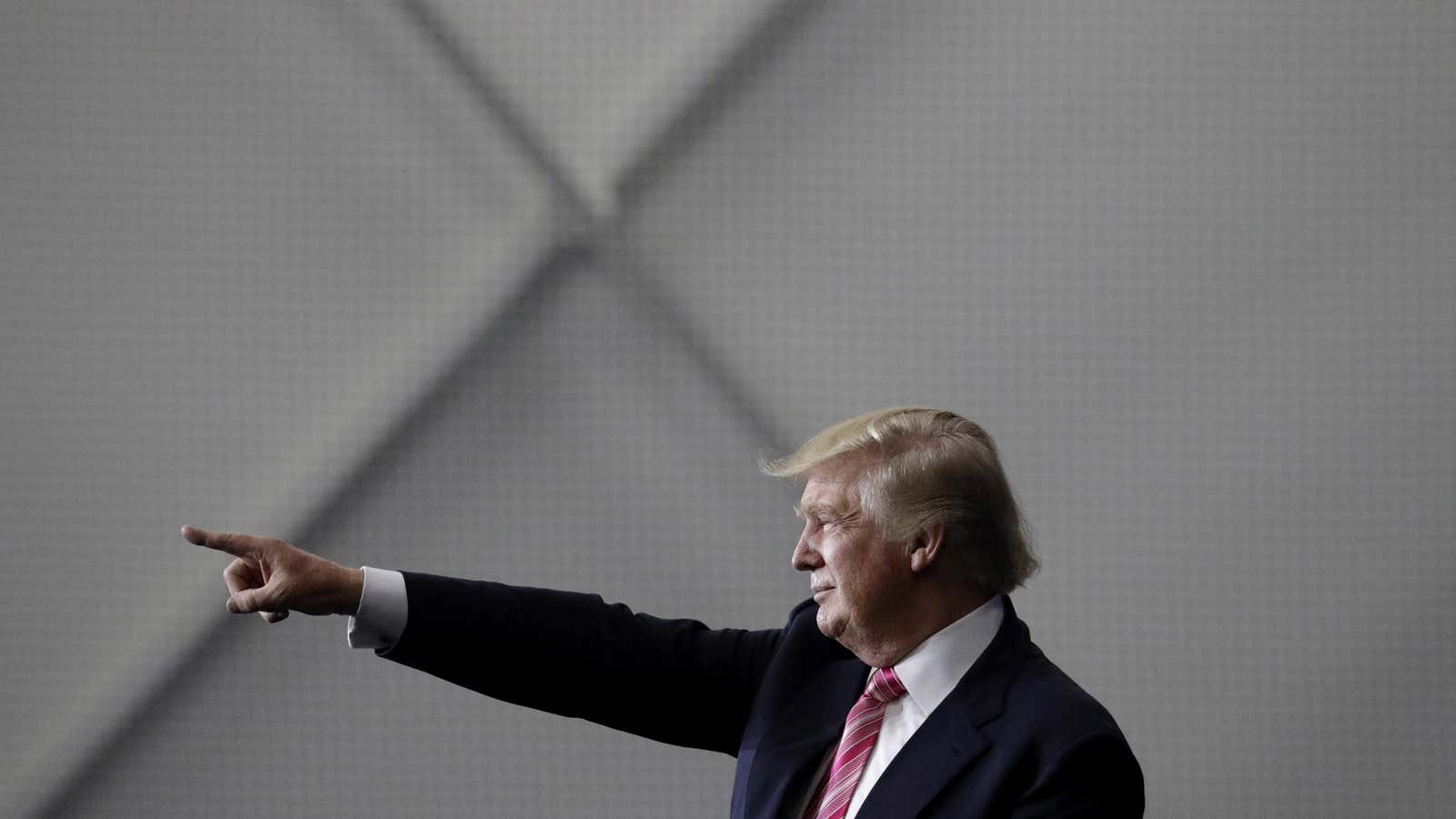Tonight (Oct. 1) the New York Times published three pages of Republican presidential candidate Donald Trump’s 1995 tax returns, an exclusive that could shed light on one of the biggest issues that has dogged the businessman’s campaign. The news organization also published a statement from Trump’s campaign calling the scoop “illegally obtained” and said a lawyer for Trump is threatening legal action.
In their letters to the Times, Trump’s campaign and lawyer neither explicitly confirmed nor denied that the pages from the returns, which were mailed anonymously last month to Susanne Craig, a reporter at the paper, are genuine.
But the catch-22 is that, in order to sue the Times for illegally obtaining his tax returns as his lawyer threatened, Trump would presumably have to admit the returns are authentic. That would give weight to foes’ allegations that he hasn’t been paying federal income taxes like ordinary voters, even if he has managed to avoid them legally. The Trump campaign’s statement comes close to acknowledging the veracity of the documents obtained by the Times, saying “the only news here is that the more than 20-year-old alleged tax document was illegally obtained.”
The tax documents published by the Times show Trump reporting a loss of $916 million, presumably the result of the collapse of his New Jersey casino empire into bankruptcy and other business disasters. The newspaper quotes tax experts as saying that he could legally use that loss to cancel out an equivalent amount of income over the next 18 years. Based on Trump’s known income in the subsequent years, including income from his businesses and his appearances on The Apprentice, a reality TV show, he could well have avoided income taxes for that period of time, the Times reports.
Unlike his opponent, Hillary Clinton, as well as his own vice-presidential candidate and every other major presidential candidate since the 1970s, Trump has released no tax returns so that the public can scrutinize his finances for conflicts of interest or other details.
Trump has argued that his returns are being audited by the Internal Revenue Service, and that he will release them only after that process is done. But the IRS has said he is not prohibited from releasing his returns, and Clinton and others have argued that Trump may be hiding something.
“So you’ve got to ask yourself, why won’t he release his tax returns?” Clinton asked in the first presidential debate, on Sept. 26. “And I think there may be a couple of reasons. First, maybe he’s not as rich as he says he is. Second, maybe he’s not as charitable as he claims to be.”
Clinton went on to suggest that Trump “owes about $650 million to Wall Street and foreign banks,” and that he hasn’t paid federal income tax for many years.
“That makes me smart,” Trump retorted.
His campaign’s statement to the New York Times said:
“Mr. Trump is a highly-skilled businessman who has a fiduciary responsibility to his business, his family and his employees to pay no more tax than legally required. That being said, Mr. Trump has paid hundreds of millions of dollars in property taxes, sales and excise taxes, real estate taxes, city taxes, state taxes, employee taxes and federal taxes, along with very substantial charitable contributions.”
The New York Times quotes a Trump lawyer named Marc Kasowitz, who in an email said Trump had not authorized any disclosure of the returns. He said that the tax returns’ publication was illegal as a result and threatened “prompt initiation of appropriate legal action.”
What may make Trump hesitate, however, is that to sue based on illegal disclosure of his tax returns, he would presumably have to state that the returns are authentic. (The Times’ wording of Trump’s lawyer’s legal threat suggests that it would be based on illegally obtaining accurate documents, rather than suing for libel and claiming the Times’ reporting is false.)
At a panel at Harvard University last month, New York Times executive editor Dean Baquet said he would “seriously fight” to publish Trump’s tax returns if the newspaper were able to obtain them, even if lawyers advised against it. The reason, he explained, is Trump’s “whole campaign is built on his success as a businessman and his wealth.”
